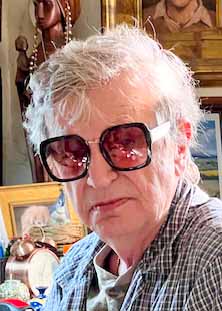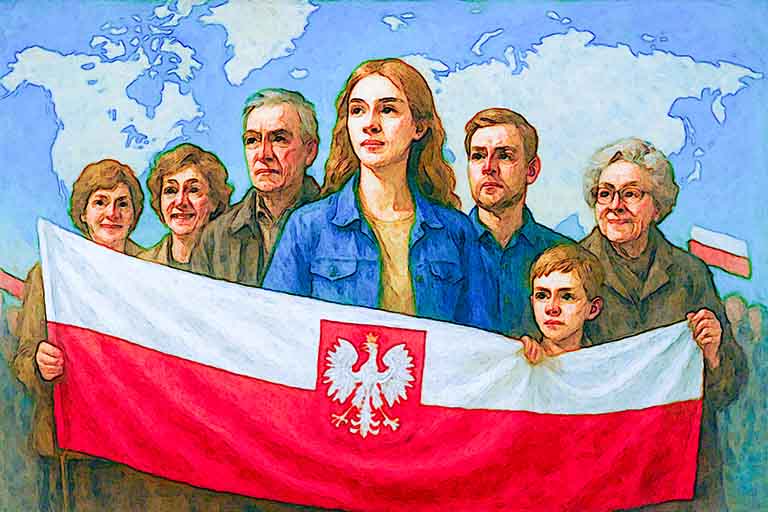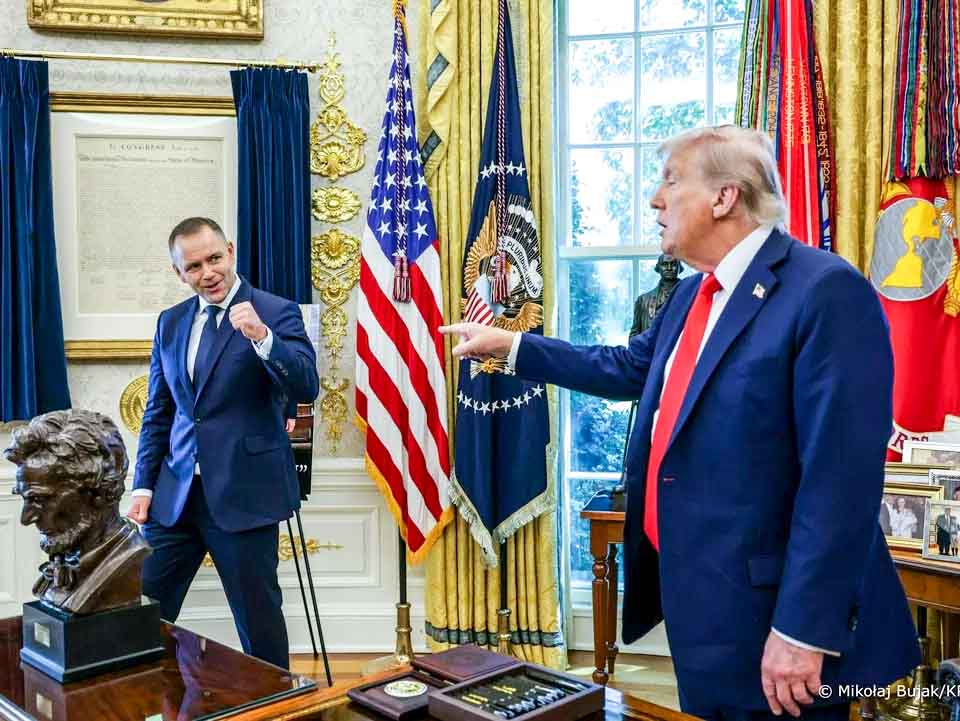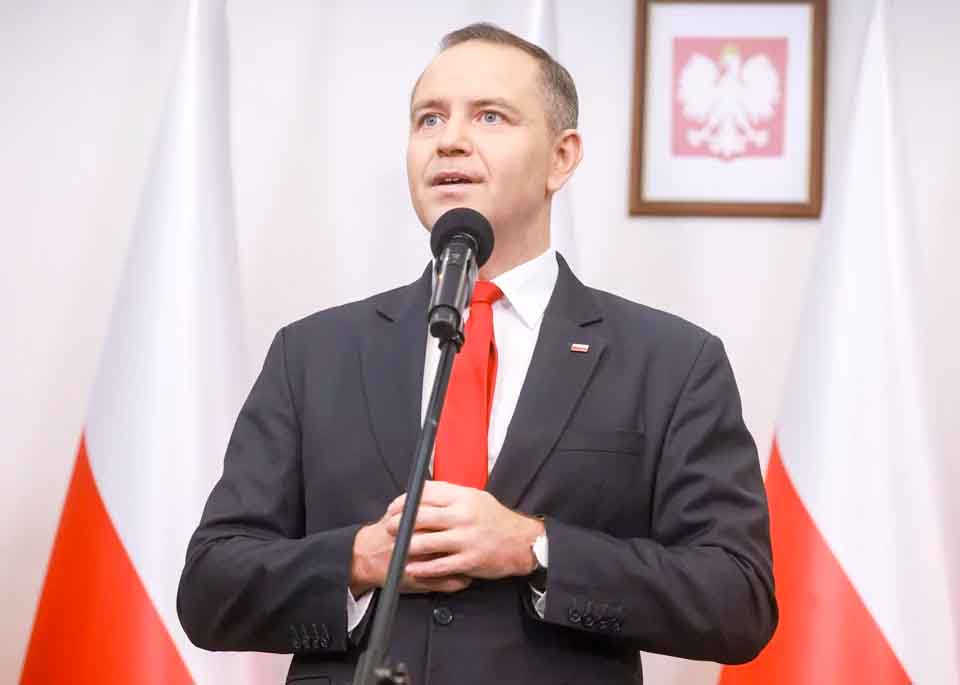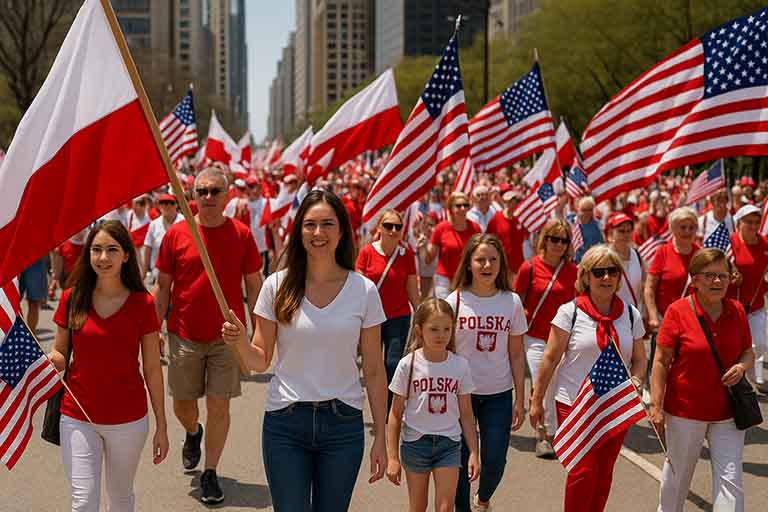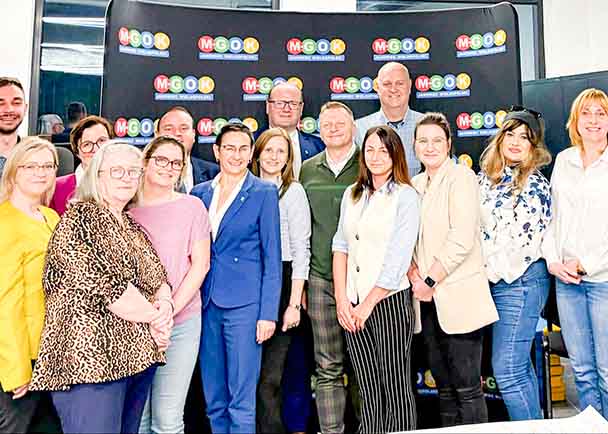Ambassador of Polish History – an honorary award granted to institutions, organizations and individuals from outside Poland who have made particular contributions to commemorating the history of the Polish nation and supporting the Institute of National Remembrance in the implementation of its statutory activities in the areas of education and science.
Edward Dusza: Our guest in this interview is Waldemar Biniecki, editor-in-chief of the legendary Kuryer Polski from Milwaukee, revived after 70 years. Member of the editorial board of Gwiazda Polarna (since 2024). Columnist and correspondent for Tygodnik Solidarność (2018-2024). American commentator for the media in Poland. Member of the Association of Polish Journalists in Warsaw, publishing in the Polish diaspora press in the United States, Canada, Germany, Great Britain, Australia, and in renowned media outlets in Poland: Tygodnik Solidarność, Do Rzeczy, Wszystko Co Najważniejsze, and others. Promoter of building pro-Polish lobbying worldwide and strategic partnerships, Pax Polonica, global Polonia, and American affairs. Consultant, academic lecturer, and Polish diaspora activist. Winner of the Maciej Płażyński Award for journalists and media serving Polonia in the 2022 category of "Journalist of a Polish Diaspora Media."
In October, by decision of the Chapter of the "Ambassador of Polish History" Award of the Institute of National Remembrance, you were named the winner of the 2025 edition of the "Ambassador of Polish History" award. Congratulations!!!
Waldemar, when did you come to the USA and how did you reactivate Kuryer Polski?
Waldemar Biniecki: I came to the United States, specifically to Milwaukee, with my wife, Susan, in 2000. We immediately became involved in Polish life (my wife, after six years in Poland, speaks Polish fluently, and her grandmothers are from Poland).
In Wisconsin, "Old Polonia," who no longer speak Polish, derives their knowledge of Poland from the American media, so it was irritating to have to explain things like Kościuszko being Polish, not Belarusian, or—especially among academics—that Bydgoszcz, where I come from, belonged to Germany for most of its history.
In my opinion, "Old Polonia" has become trapped in a historical bubble created by elements like Polka, sausage, and paper cutouts, and these are the foundations of their Polish identity. The Polish language, as a significant element of Polish heritage and national culture, ceased to play a significant role. Slowly, "Old Polonia" began to assimilate into American life, for which Polishness was no longer fashionable. However, I was very lucky. I was invited to the editorial office of "Radio Polonia" in Milwaukee, and during one of my broadcasts, I received a call from Professor Kamil Dziewanowski, who invited me for cognac at his residence.
I then asked Susan, who worked at the Institute of International Affairs at the University of Warmia and Mazury: who was Mr. Dziewanowski? She replied that he was an eminent Polish professor at the University of Warmia and Mazury, and that he held the title of count. And so began a new phase in my emigration career. Professor Dziewanowski became my mentor, and he taught me everything. From verifying the version of history I knew from Poland to instilling in me a great respect and admiration for all Poles who shaped Polish history here abroad.
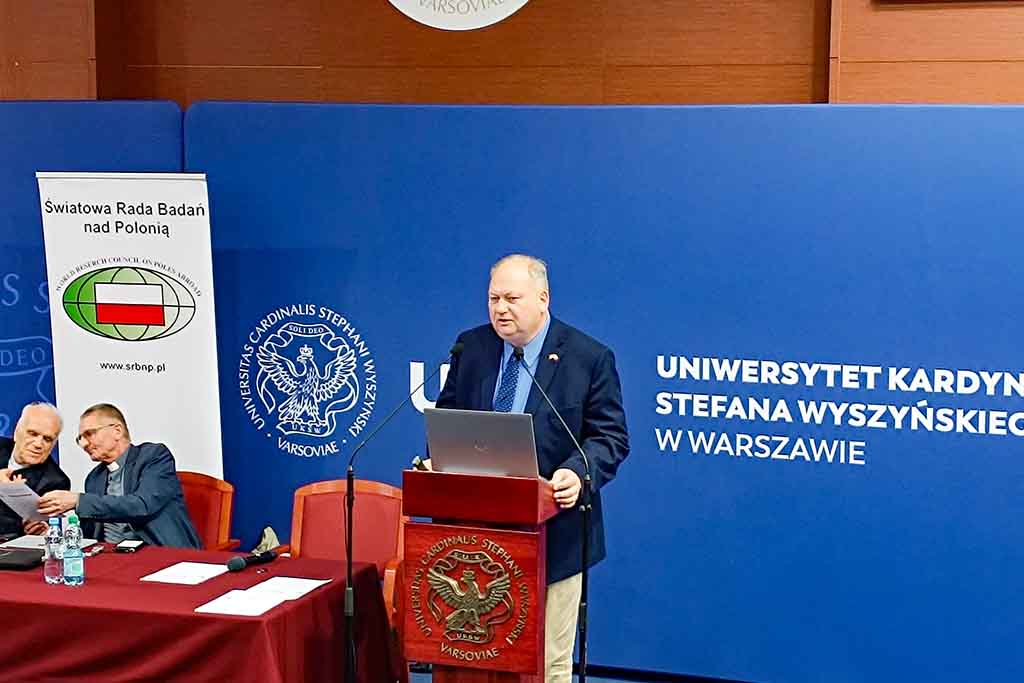
Waldemar Biniecki's lecture at the Catholic University of Lublin. (Source: W. Biniecki)
I became active in the Polish American Congress, and even later was elected president of the Polish American Congress in Wisconsin, somewhat bringing it into the 20th century. Then our son, Daniel Kazimierz, was born, my wife defended her doctorate, and then accepted a professorship at Kansas State University. And so began a new chapter in our lives. We moved to Kansas.
Edward Dusza: You said Susan worked at UWM. Did you work at the university too?
Waldemar Biniecki: My academic journey in the United States began in Milwaukee, taking courses on Polish history and culture at MSOE (Milwaukee School of Engineering). After that, I spent several years teaching Polish and cultural elements at UWM in Milwaukee. After that, I worked at Kansas State University, where I spent several years teaching students from Ecuador, teaching them techniques for working with English as a foreign language. In Kansas, in 2012, I began my professional career in editorial journalism, launching it with the iconic article "How to Heal the Polish American Congress," which, despite its naivety, remains relevant today.
Edward Dusza: I remember your first articles in Gwiazda Polarna.
Waldemar Biniecki: Yes. First there was Gwiazda Polarna, Dziennik Związkowy, Nowy Dziennik, Biały Orzeł, Kanada Goniec, Polish News, British Poles, Dziennik Berliński, then the Polish press. Portal Solidarni 2010, Magna Polonia, W Polityce, Prawy.pl , TV Republika portal, Fronda, and then Tygodnik Solidarność, which, after a year of publishing my articles on Tysol.pl, offered me weekly columns, writing which, over the course of six years, taught me an extremely concise way of expressing my thoughts.
Today, I publish in Poland primarily on the "Do Rzeczy" portal. I've noticed that the situation for the Polish press abroad is quite complicated, as the media in Poland are unfortunately not interested in the Polish diaspora as a key element of the strategy for promoting the Polish raison d'état, the Polish economy, and Polish cultural heritage abroad.
In the pre-war period, 250 Polish journalists were active in the United States, and they were very sympathetic to the Polish government. Polish embassies worked with them, providing them with up-to-date analyses and materials. Today, the situation of the Polish press in the United States is rather dire. The divisions within the Polish press run precisely along American lines, and the influence of the new right-wing formation, the Confederation, must be added to this. Most liberal media avoid politics, while some right-wing outlets adopt positions unfavorable to the politics in Warsaw. The PiS media, in turn, create their own network of commentators, ignoring the Polish media's message and the media itself.
Edward Dusza: How did the idea of reactivating Kuryer Polski come about ?
Waldemar Biniecki: As the number of articles about Polish figures in the diaspora grew, I began to discover that a large group of Polish activists came to America from the Greater Poland area: Teofil Starzyński and Jan Smulski. The founder of Kuryer Polski, Michał Kruszka, himself came from Słabomierz, a village just thirty kilometers from Bydgoszcz. Kuryer Polski was the first newspaper in the US to formulate its mission in 1888: "representing Polish interests in America." That's why Katarzyna Murawska and I proposed this very name and mission for the portal.
Kruszka achieved unprecedented success. Kuryer Polski became a joint-stock company, and its shareholders were mostly its readers. It was a newspaper that championed Polish causes, and Kuryer's most spectacular success was the campaign for a Polish auxiliary bishop amidst the then-dominant German-origin clergy in Milwaukee. Kuryer was even excommunicated, but it achieved his goal. Michał Kruszka became a state senator and wielded enormous influence over the Polish community and American politicians in Wisconsin.
Edward Dusza: Waldemar, why do you write and deal with Polonia?
Waldemar Biniecki: Because in Poland and in the Polish diaspora media, no commentators are addressing this topic, and the Polish diaspora possesses enormous untapped economic, political, and scientific potential. By pursuing a bipartisan policy, it is possible to create a massive pro-Polish lobbying effort here in America, similar to that which occurred during the Cold War, where the American Polish diaspora, along with the British emigrants and the London government, preserved Polish identity and historical memory.
It had a significant political presence: congressmen and senators deeply involved in American foreign policy. The most important of these included Edmund Muskie (Edmund Marciszewski), one of the most influential senators, Congressman Klemens Zabłocki of Milwaukee, long-time chairman of the Foreign Affairs Committee in the US Congress, and many others.
Today, there is a lack of leadership within the organized Polish diaspora; individual leaders push their priorities, capitalizing on them politically. The rest languishes in anticipation of slow assimilation. The most endangered is the Polish national heritage, accumulated over decades and housed in a few Polish community centers. Without a vision and a plan for its preservation, the fate of these collected artifacts remains uncertain.
Edward Dusza: What do you think is currently the greatest threat to the Polish American community?
Waldemar Biniecki: We have a new political situation in the United States. The Polish American community has become very involved in Donald Trump's campaign. According to Trump himself, approximately 85% of American Poles voted for him in the last election. We also voted for President Nawrocki, for which we are now being punished by the government in Warsaw.
The lack of leadership among the Polish American community and the inability to finance politics have led to the retreat of American political elites from the Polish diaspora. Joe Biden himself explains this process perfectly in an interview with The New York Times. Following the death of Jerzy Giedroyc and the folding of flagship Polish diaspora projects, the intellectual life of the Polish diaspora has been slowly declining. Large cities are withdrawing into themselves, and Polish diaspora media outlets are trying to imitate mainstream media. Polonia is slowly losing its culture-forming role.
People chase gadgets, hoping to impress after Mass at the Polish parish with a new car or outfit. The lack of leadership and inconsistent priorities are evident everywhere. Each current Polish diaspora leader has their own priorities, which they seek to capitalize on for political gain. Some are tasked with specific political positions by individual politicians in Warsaw. Polish diaspora politics have simply ceased to exist.
You could say that Polonia was crushed by the secret police, and now it's being played by individual political factions in Warsaw. A few months ago, I wrote an article in which I spoke about the identity of the Polish American community, saying that the foundation of our Polish identity is the Blue Army, and that we should honor them and the Marshal during Independence Day.
If we really want to build pro-Polish lobbying in the US, we must first of all accept the assumption that it cannot be built based only on one political option.
The patriotism festival is also a problem that continues to fragment the Polish diaspora. There are tiny organizations in the US that usurp the right to be "true patriots." I often encounter accusations that my articles aren't very patriotic because they aren't always favorable to the government, or because they don't support a given leader, or because they don't mention vaccines. Then I usually respond that I'm not a propagandist, just a journalist.
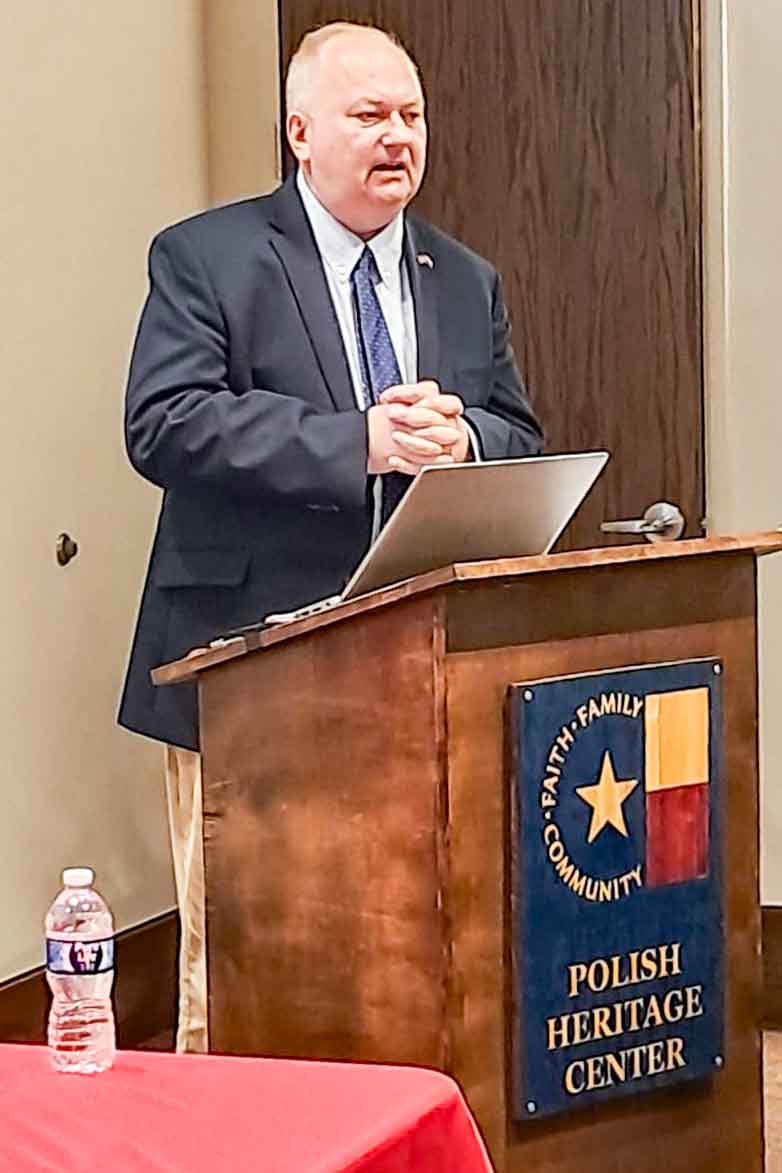
Waldemar Biniecki's lecture in Texas in 2025 (Source: W. Biniecki)
Another threat is the slow disappearance of Polish culture from the American public sphere. Polish language and Polish history programs at American universities are being closed or transferred to Russian scholars, causing a rapid and natural erosion of these fields. As a Slavic language, Polish often finds its way to Slavic institutes, whose directors are usually Russians. These institutes employ scholars according to their own criteria. Support from Poland for such institutions is minimal or nonexistent.
Another issue is the lack of vision and action by our flagship Polish diaspora projects in large cities, which claim professionalism. I was once even told, "I have a PhD in Polish history, and you?" I replied that my articles reach the most important desks in Warsaw. The assumption that being from Chicago, New York, or Washington is sufficient proof of professionalism is utter nonsense.
Edward Dusza: So what do you think is most important for the Polish American community?
Waldemar Biniecki: In my opinion, the most important thing for the Polish diaspora is to rebuild its political importance and have a few congressmen and senators in both parties in the states with the largest Polish population.
The first step is to rebuild bilingual Polish media in the US. And Polish media outlets cannot claim to be apolitical and are prohibited from engaging in political promotion. I've heard such nonsense from leading "journalists" in Polish media outlets.
We must rebuild state structures, learn how to raise funds for the Polish diaspora, and learn how to invest in new leaders. Claims of apoliticality or "our foundation is not involved in politics" won't help here.
The Polish diaspora must once again have its own policy promoting the development of Polish life within the Polish diaspora. It is precisely this avoidance of political involvement that has brought the Polish diaspora to its knees. Those who have held positions in Polish diaspora organizations for years and achieved no success must leave. They must be replaced by younger, braver, and perhaps better educated individuals. Only generational renewal will guarantee our development. Now, as a Polish diaspora, we are drifting towards a reef—a predicament called assimilation. This is about our survival as an ethnic group.
Another issue is global cooperation among Polish diaspora. Currently, strategic decisions regarding global Polish diaspora are made by a single Lithuanian gentleman who has no interest in the affairs of the American Polish diaspora. What matters is the money, which flows abundantly to liberal-leftist European organizations. Not long ago, I presented a project for a Polish diaspora think tank called the "Paderewski Institute," outlining the vision, mission, and goals of this organization. To no avail.
My role as a journalist is to objectively demonstrate the need to rebuild Polish lobbying, to inspire others by presenting my ideas, and to demonstrate how we can build something that can serve both America and the Republic of Poland. This is precisely the purpose of Kuryer Polski, which was reactivated in September 2020 and must continue to evolve.
After the first five years, we have exciting plans for developing this project. We are seeking a strategic sponsor, planning to launch a YouTube channel, and expanding our use of artificial intelligence.
I cordially invite you to the pages of Kuryer Polski and Gwiazda Polarna.
Translation from Polish by Andrew Wozniewicz.



